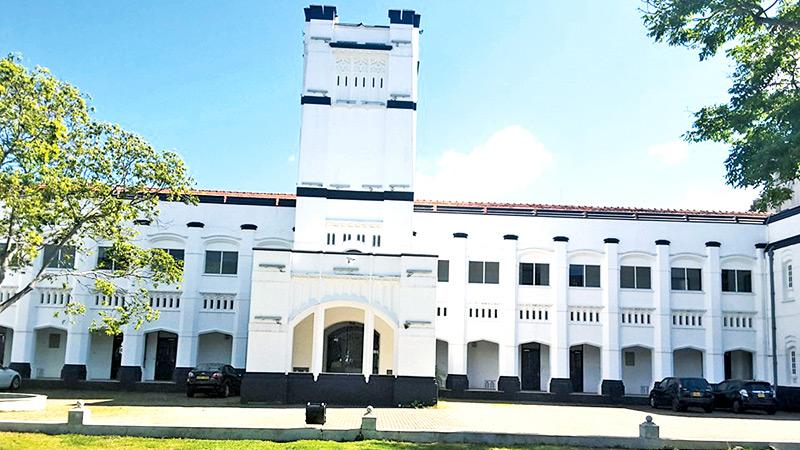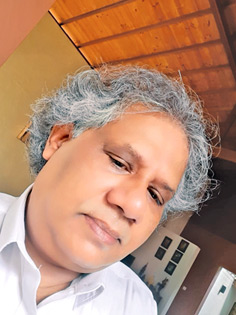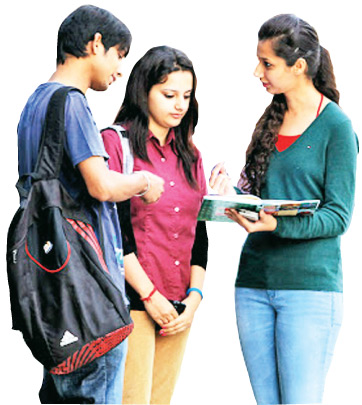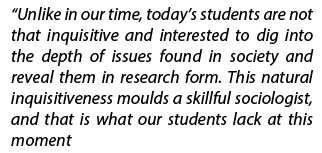

The new Parliament was sworn-in recently with a hint on the importance of absorbing the assistance of the patriotic intellectuals of the country, which must be the first time in Sri Lankan history after gaining independence from colonial rule.
``There are many untapped intelligentsia in the country whose knowledge is restricted to university lecture halls and to printed material they publish or a revelation of their work through the media. Besides that their lifelong scholastic erudition, research done with much effort and other experiences, go waste,” Prof. D.A. Premakumara de Silva, Chair, Senior Prof. of Sociology and Dean, Arts Faculty, University of Colombo, said.
“Not much interest has been taken so far by the authorities to utilise their research work in implementing new projects in the development of the country, or find solutions for the social problems and relevant stigma. However, with the new Presidency there is a ray of hope that the prevailing system would end, and the educated would be availed of,” said the Dean.
As regards contemporary undergraduates in universities he said, ``It may be due to the less accolade or recognition received, except for a few, that a majority of university students have less self persuasion for reading and digging into the history of their subject; enhancing their general knowledge and even going out to the field for research work which is a must, especially if one wants to become a good Sociologist. Many of them are satisfied with the day to day lecture notes and the guidance given by the lecturers, and hardly tune their brains to `think differently’ which is the need of the hour for a better society.”
``A few years back, I noticed that our students found it difficult to grasp the theories of Sociology. This was because they had hardly any knowledge of the basics.
It made me translate the book written by Indian author, S.L.Doshi, a renowned sociologist. However, I omitted the segments that were not relevant to Sri Lankan society. It is a well guided book for Sri Lankan students when it comes to the theoretical side, but Sociology is not merely based on theory, but in research and a practical sense as well,” he said.
“Unlike in our time, today’s students are not that inquisitive and interested to dig into the depth of issues found in society and reveal them in research form. This natural inquisitiveness moulds a skillful sociologist, and that is what our students lack at this moment.
May be due to their preference for easy access which is, memorise the notes, pass the exams, graduate and finally find a job for their living. But we must remember there are at least a few who know their responsibility to society and duty to the country,” the Prof said.
He said that having an aim since the adolescent age would direct one to choose his or her most preferable field, and thereby gain satisfaction in one’s profession. He stressed this because he sets himself as an example…
 Dalkandura Arachchige Premakumara de Silva was born and bred in Pinwatta, a semi urban area in Panadura. After his primary education at Siri Sivali Maha Vidyalaya he entered Sri Sumangala Maha Vidyalaya to complete his secondary education. Although his parents wished him to select the Maths stream for A/Ls to be a Math graduate or an Engineer, young Premakumara’s vision was set on Arts. Hence he entered the Siri Saddhamma Pirivena (University College) at Pinwatta to study Arts. His subjects were Economics, Buddhist Civilisation, Sinhala and Geography which he could get through with flying colours, and was selected to the Colombo University.
Dalkandura Arachchige Premakumara de Silva was born and bred in Pinwatta, a semi urban area in Panadura. After his primary education at Siri Sivali Maha Vidyalaya he entered Sri Sumangala Maha Vidyalaya to complete his secondary education. Although his parents wished him to select the Maths stream for A/Ls to be a Math graduate or an Engineer, young Premakumara’s vision was set on Arts. Hence he entered the Siri Saddhamma Pirivena (University College) at Pinwatta to study Arts. His subjects were Economics, Buddhist Civilisation, Sinhala and Geography which he could get through with flying colours, and was selected to the Colombo University.
In July 1983, he came to live in his aunt’s house at Gothami Road, Borella to start his university journey. Until then his life was like neatly lined beads on a strong string as nothing much happened to shake him.
“I was 19-20 years then. Borella was the centre of the Black July riots. When we heard about the calamity at midnight on the first day, my cousin and I stepped out to see what was going on. We were eye witnesses to the heinous acts of the rioters, a group of Jathika Sevaka Sangamaya members of the United National Party (UNP) who were glancing at a sheet of paper containing a list of premises of Tamils and attacking them.
It was the group of UNPers and not the general Sinhala public who committed that. It was a very well organised crime,” he said.“There were two houses of Tamil families living close to my aunt’s.
One house was on flames (set by rioters). We rushed in and dragged the family out, including a baby and helped them to escape. We then quickly broke the wall between the two houses to stop the flames spreading. We were both injured and in shock.
But we can still recall it, marvelling at how we took an instant decision and acted with such strength and energy,” he sighs.
Premakumara entered the Colombo University and selected Geography, Economics and Sociology for his first year. With his results he was eligible to do a Special degree either in Geography or Sociology. Sociology being a newly introduced subject, and the attractive style of teaching adapted by the Sociology lecturer, Dr.Newton Gunasingha made many a student including Premakumara to choose Sociology.

From the very first day that he sat in the lecture hall attending his first lesson, his love for Sociology has been growing and glowing to this date, making him one of the best lecturers and researchers doing his `social’ duty to the utmost satisfaction.
“Our batch should have passed out in 1987, but due to the JVP insurgency, we stagnated till 1990. What a waste of time of the youth,” he said in dismay. After passing out with an Honours degree, the enthusiastic Premakumara was heading for more research work.
He willingly accepted the research offered him by the Sociology Department on the health and wealth of the Janasaviya families (Janasaviya was a dole given by the Government to underprivileged families). Under the guidance of Prof. Siri Hettige he was assigned as Co-ordinator of the project for Hambantota, Hanwella, Akurana and Kobeigane which gave him quite a vast exposure.
Soon after this John Keells conducted an exam for the newly passed out graduates for Management Training. Premakumara too sat the exam and was one of the five selected.
He was at a decisive point, whether to choose the academic career, or accept the Private sector which offered double the salary of an academician. “I’ve never regretted my choice – to become an academician,” he said. Premakumara became a permanent member of the University academic staff in 1993.
`Globalisation and Transformation of Planetary Rituals of Southern Sri Lanka’ was the research he opted for his thesis for his Master’s which was guided and sponsored by two leading Anthropologists, Prof. Ganganath Obeysekara of Prinston University, USA and Prof. Jonathan Spenser of Edinborough University, Scotland, UK.
The research was done to find out whether the Sri Lankan traditional rituals such as Thovil, Bali and witchcraft for protection from evil and so on practised in the southern villages for generations, were dying and disappearing in modern day thinking. But the young researcher found and showed how wonderfully all such rituals were re-appearing, in the modern context of globalisation. He completed his research in 1999.
His work was highly rated by both Professors. Prof. Spenser invited Premakumara to do his PhD at the Edinborough University. The five-year-study (2000-2005) guided and sponsored by Prof. Spenser consisted of research on the informatical and historical details of the sacred Sri Pada, in Sri Lanka.
``It was a big project and a challenging task as I had to climb the Sri Pada mountain 15-16 times up and down during the six months of the Sri Pada season.
I roamed around all the villages in the Sabaragamuwa Province where the sacred mountain is located; meeting people who were living there for generations, visiting ancient Buddhist monasteries and Buddhist priests, attending religious ceremonies, collecting archives info and so on…. It was tiring but very interesting. I acknowledge the support given to me by the late Ven.Handapangoda Wimala Thera, the then chief incumbent of Palmadulle Raja Maha Vihara, the Temple that Sri Pada belonged to,” he said.
“Unlike religious places such as Jerusalem, where many fights have occurred from time to time for its sole possession, I’ve found a marvellous ethnic harmony at the sacred Sri Pada where all communities come to worship. The tolerance of the Buddhists condoning other believers who claim Sri Pada as `their’ religious place, sets a wonderful example to the world,” said the Prof.
Prof. Premakumara de Silva has held the posts of Deputy Vice Chancellor and Head of the Department of Sociology before he was appointed to the present post as the Dean, Faculty of Arts, Colombo University.
The 460-page research work he did on Veddahs (Sri Lankan tribal group) in 2009-2010, was the only such complete work done on this ancient tribe after a British scholar’s research done one hundred years ago.
He has written 5-6 books, but all are academic. His work has been published only at academic level such as by the International Centre for Ethnic Studies in Colombo, SAARC journals and in the form of presentations and articles abstracted by the media from time to time.
Apart from his academic tasks, Prof.Premakumara is in the five-member UGC Committee appointed by the President in January this year. The task is to make amendments to the `University Act of 1978’ by revising, and changing it, to introduce new policies and courses to fit modern day Sri Lanka.
Along with this, it will soon be a must for every university student to get IT and English knowledge as an extra qualification for the job market. These courses will be from general certificate to Diploma level in accordance with the students’ preference.
In addition, the Sociology Department of the Colombo University offers post Diplomas for outside students who wish to enhance their knowledge and receive a higher educational certificate.
Prof. Premakumara said Sociology should introduced to the school level as well. “Sociology is a subject that should be taught as a compulsory subject in O/Ls, and the A/L Arts stream as it talks about social issues. I’m sure schoolchildren will ardently embrace it and it will definitely be among the most popular subjects,” he said.
He said the research work and their detailed reports done by the Sociology Department are usually sent to the Government Ministerial bodies to implement it. “Once we send them out it’s their responsibility to act on that,” said the Professor.
Apart from being an excellent researcher committed academician, Prof. Premakumara is a successful family man. His wife Chaithrika de Silva is in the school education sector. His son holds a Managerial post in a reputed British educational institute in Sri Lanka while his daughter is a prospective university student.
